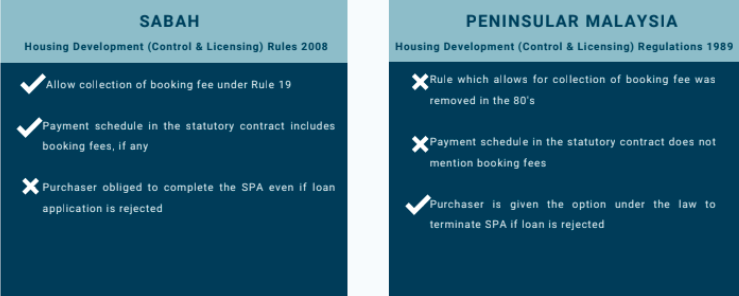A new federal court ruling declares that the calculation of a late delivery payment or Liquidated Ascertained Damages (LAD) begins from the date the booking fees, instead of from the signing of the sales and purchase agreement (SPA). The LAD is designed to cover any predicted losses occurred in case of a project overrun or being delayed, following the case between a purchaser and the developer, PJD Regency Sdn Bhd.
How does this new ruling impact developers in Sabah?
Following the announcement of the PJD case ruling, housing developers have speculated whether the new calculation applies to cases in Sabah as the state has its own housing laws that differ to the regulations imposed in Peninsular Malaysia. Should the PJD ruling apply to cases in Sabah, developers may find themselves on the receiving end of the liability that they will not have budgeted for. In 2019 alone, 65% of all developments in Sabah were residential which means developers of 2,199 residential units from 2019 could be affected.
In a live forum titled “The Impact to Sabah Developers” on the LAD calculation, Chairperson of the Land Law Revision Subcommittee in the Sabah Law Society, Chua Chinn Harn shared valuable insight into the major differences between the statutes of housing laws in Peninsular Malaysia and Sabah.

Decision factors of court ruling may conflict with unique housing laws
There were two main deciding factors for the PJD ruling, one being the illegality of the booking fee collection in Peninsular. As Chinn Harn shared, it is not illegal to collect booking fees in Sabah. Another deciding factor was the social legislation to protect the purchaser, therefore giving the developer an argument that the PJD case should not apply in Sabah as developers do not breach any laws by collecting booking fees.
What is your risk appetite?
The main takeaway from this was that due to conflicting rules and regulations, the decision of whether the new calculation of LAD applies to Sabah is still vague but is not 100% applicable and there are grounds to argue a case. However, in the case that a developer has a low-risk appetite in the progress of its development, whereby they have not yet started the construction of a project, legal advisor to the Chief Minister of Sabah, Datuk Brenndon Keith Soh, advised developers to not take the risk of collecting a booking fee.
“It would be prudent to not follow the federal court ruling should you have a low appetite. It is better to miss out on a RM1000 booking fee than to risk paying a much larger amount of a LAD payment, should you fail to deliver on time,” he advised.
Does the COVID-19 Enactment offer protection?
To cushion the fall of the pandemic, Sabah implemented the COVID-19 Enactment. The temporary measure was passed by the Legislative Assembly on 23 December 2020 to protect purchasers and developers for the period starting from 18 march 2020 until 31 December 2020. It rules that no late payment from purchasers would be charged for unpaid instalments during this period and the purchaser may apply for an Extension of Time (EOT).
Developers are also excluded from the calculation of time during that period for delivery of vacant possession and liquidated damages. They may also apply for EOT up until 31 March 2021, according to the COVID-19 Enactment in Sabah. This should be taken into consideration when looking at the new LAD ruling.
That’s not the end
Also present as a co-host of the session was Datuk Chua Soon Ping, the Group Managing Director of Remajaya Sdn Bhd, and during which he posed a question to the 170 participants “Is the PJD ruling fair?”. 30% voted no, 60% were unsure. The participants consisting of lawyers, bankers, developers and other stakeholders then asked the panellists to elaborate further on certain factors, including what happens in the case that the developer received payment from the purchaser at a discounted rate but now has to pay the LAD according to the full amount that was stated in the Sales and Purchase Agreement (S&P).
Chinn Harn advised that generally, a court decision would have to follow the S&P price paid and therefor the rebates and gifts would not be excluded in the sum computation of LAD calculation. However, for government-enforced discounts such as the Home Ownership Campaign, there is then concrete evidence to back an argument up as it would be reflected in the S&P contract.
What if the booking fee was collected by an outside party such as the real estate agent or lawyer? Chinn Harn stated that should Sabah follow the federal court ruling then it is an offence for an outside party to collect payment and they would also be considered liable.
For commercial developments, it would depend on the terms agreed in the S&P. As the federal court ruling is based on social legislation, Datuk Brenndon argued that commercial development purchasers may have equal bargaining power as the developer, making it not applicable to commercial developments.
In closing, the panellists of the session called to all stakeholders of the industry including the state government, the Sabah Housing And Real estate Developers Association (SHAREDA) and the Sabah Law Society to have a discussion for a legislative reform to address this issue. This event was organized by Sabah Economic Advisory Council (SEAC) and sponsored by Baysuites.

.jpeg)
.png)




.png)
.png)


.jpeg)
